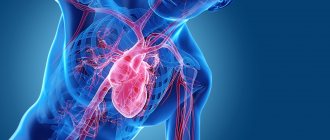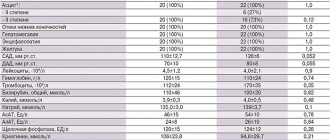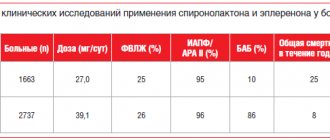Chronic heart failure (CHF) is a disease characterized by the inability of the heart to pump a certain volume of blood sufficient to provide the body with oxygen. CHF can be caused by many diseases of the cardiovascular system, the most common of which include coronary heart disease, hypertension, endocarditis and rheumatoid heart defects. Weakening of the heart muscle leads to the impossibility of normal pumping of blood, as a result of which the amount of blood released into the vessels gradually decreases.
The development of heart failure occurs gradually; in the early stages, the disease can manifest itself only during physical exertion, then it begins to be felt at rest.
The appearance of characteristic symptoms at rest indicates that the disease has entered a severe stage. The progression of chronic heart failure threatens a significant deterioration of the patient’s condition, a decrease in his working capacity and even disability. The development of chronic liver and kidney failure, blood clots, and strokes may occur.
Conducting timely comprehensive diagnostics and competent treatment ensures a slowdown in the development of CHF and the prevention of dangerous complications of this serious disease.
In order to stabilize the condition, a patient diagnosed with “acute and chronic heart failure” must adhere to the correct lifestyle: normalize his weight, follow a low-salt diet, limit physical and emotional stress.
Policy on the processing and protection of personal data
This site is maintained by AstraZeneca. We maintain the confidentiality of our site users' information and the security of their personal data.
The Policy describes the principles we apply when we use personal information provided by our users or collected about them online. You express your consent by using this site or registering as a user of interactive services (as applicable) provided by us. Please read our Policy on the processing and protection of personal data carefully. Any disagreements arising regarding the processing of personal data will be considered in accordance with this policy, the notice of data processing provided to you and the norms of the legislation of the Russian Federation.
We may periodically make changes to the Policy on the processing and protection of personal data and, in this regard, we ask you to regularly check the contents of this Policy to ensure that you are using the most current version applicable to this site. We will notify you of any changes upon receipt of your request.
Chronic heart failure: risk group
The following risk factors, or at least one of them, can provoke the development of CHF. When several factors are combined, the likelihood of chronic heart failure increases significantly.
The risk group for the development of CHF includes patients suffering from the following diseases:
- cardiac ischemia;
- history of myocardial infarction;
- high blood pressure;
- heart rhythm disturbance;
- diabetes;
- Congenital heart defect;
- frequent viral diseases;
- chronic renal failure;
- alcohol addiction.
DESCRIPTION OF THE INFORMATION WE COLLECT AND HOW WE USE IT
1. General information
Like many commercial organizations, we monitor use of this site by collecting aggregate information through cookies (see below). As a rule, we keep statistics on the number of visits to the site, each web page and register the name of the original domain of the Internet service provider whose services the visitor uses. The information obtained allows us to make conclusions about the use of the site by the visitor, and may also be transferred to other companies of the Group and other third parties.
2. Personal information
When you register as a user on our website or fill out an online form (for example, to receive email updates), we collect personal information about you, such as your first and last name, email address, country of residence, and other information you provide voluntarily.
We are committed to improving the content and functionality of our site. Therefore, through cookies (and other similar technologies) we collect information about your use of this site (see below). We may also monitor navigation and use of the site in order to improve its design and structure, taking into account user preferences by tailoring content. By doing this, we strive to make the site more user-friendly. We may also conduct statistical analyzes of our user accounts to determine the proportion of active users, the frequency of their visits, and the number of other sites they are registered with.
In some cases, we may receive information about your opinions, for example when you send us feedback or ask questions, as well as information about you from other publicly available sources, which we will supplement with information we already have in order to improve the service to suit your specific requirements. user.
If you provide information about another person, such as your colleague, you confirm that you are acting on the instructions of such person and provide his consent to the processing of his personal information, including important personal information, and also confirm that you have provided such person with information about us and about the purposes (in accordance with this Privacy Policy) for which personal information will be used.
We may provide personal information upon request to comply with legal requirements.
You consent to our transfer of information to countries or jurisdictions that do not provide legal protection for data protection to the same extent as your country. When we make such a transfer, we are committed to ensuring that your information is adequately protected.
All personal data provided to AstraZeneca Pharmaceuticals LLC, as well as companies included in the group (including those entered on the website), can be used and processed, in addition to the above, also for the purposes of:
• providing scientific medical and any other information about AstraZeneca products, as well as materials in written, printed, electronic, audio, video, oral and any other appropriate form, via email, regular and courier mail, telephone calls, SMS messages , messages on social networks on the Internet, in person and/or in any other appropriate way;
• invitations to scientific, educational and other events aimed at improving the professional level of relevant specialists, in all the above ways and in all the above forms;
• creating a database of persons who provided their personal data.
The person who voluntarily provided his personal data and information is notified and consents to the processing by AstraZeneca Pharmaceuticals Limited Liability Company, all other companies included in the group, as well as any third parties to whom AstraZeneca Pharmaceuticals LLC transfers the relevant personal data for the purposes specified above, and subject to the obligatory condition that these persons ensure the security of the personal data provided above, including collection, recording, systematization, accumulation, storage, clarification (updating, changing), extraction, use, transfer (distribution, provision, access, including cross-border transfer), depersonalization, blocking, deletion, destruction with or without the use of automation tools. Also, the Person who voluntarily provided his personal data and information is notified and agrees that during the cross-border transfer of his personal data, recipients of such data may be located in foreign countries that do not provide adequate protection of the rights of personal data subjects. Operators, at the same time, undertake to take all reasonable and appropriate actions to ensure the confidentiality and security of any Personal Data transferred to the territory of any foreign countries.
This consent to the processing of personal data is given for an indefinite period and can be withdrawn by sending a written application to the site administration. I hereby acknowledge and confirm that I have read and agree with the rights and obligations in accordance with the Federal Law of the Russian Federation of July 27, 2006 No. 152-FZ “On Personal Data,” including the procedure for revoking consent to the processing of personal data.
Filling out the form for providing Personal Information implies agreement that any personal data provided by filling out this form can be used, taking into account the consent provided, in accordance with the requirements of the Federal Law of the Russian Federation of July 27, 2006. No. 152-FZ “On Personal Data” and stored for ten years at (125284, Moscow, Begovaya St., 3, building 1) for registration and response to this request for scientific medical information.
Chronic heart failure: treatment, drugs
CHF is a disease in which patients need to constantly take medications. For chronic heart failure, drugs are used that help slow the progression of the process and improve the patient's condition. In some patients with CHF, treatment requires surgical intervention.
Medicines for chronic deficiency are primary, auxiliary and additional.
The main drugs include ACE inhibitors (angiotensin-converting enzyme), angiotensin receptor antagonists, beta-blockers, aldosterone receptor antagonists, diuretics, ethyl esters of polyunsaturated fatty acids, cardiac glycosides. Cardiac glycoside for the treatment of chronic heart failure is used most often in patients with atrial fibrillation.
Auxiliary drugs for chronic heart failure are used in special clinical situations with complications of CHF. These include nitrates, calcium antagonists, antiarrhythmic drugs, antiplatelet agents, and non-glycoside inotropic stimulants.
Additional medications for chronic insufficiency: statins, indirect anticoagulants.
For patients diagnosed with chronic heart failure, clinical recommendations from doctors relate not only to taking medications, but also to revising their lifestyle in general:
- it is necessary to stop smoking and drinking alcohol;
- bring your weight back to normal;
- follow a salt-free diet. Nutrition for CHF should be balanced, contain a sufficient amount of proteins and vitamins;
- walk more in the fresh air.
USING COOKIES
Our website uses cookies. Below you can find out more about how we work with them and how they can be controlled.
When you visit this website, you consent to the use of cookies in accordance with this cookie notice. If you do not agree to these terms, please disable cookies by following the instructions in this cookie notice to prevent cookies from being stored on your device by this website.
What are cookies?
Cookies are small text files that are sent to your device when you visit a website. The cookies are then returned to the original website on each subsequent visit, or to another website that recognizes the cookies. Cookies act as memory for a website, allowing the website to recognize your device when you visit it. Cookies can also remember your preferences, improve your user experience, and tailor the advertising you see to suit your needs.
You can find more information about downloaded cookies, including how to set cookies on your device, as well as how to manage and delete them, at: www.aboutcookies.org
Types of cookies:
Sessional and permanent
We may use session cookies: these only last until you close your browser. But we also use persistent cookies, which are stored for a longer, specified period of time.
Third Party Cookies
Our website may allow providers to load third party cookies on the services we offer. These files are not under our control. For more information about how a third party provider uses cookies, please visit the website of the relevant third party provider. Detailed information about the third-party cookies running on this website, including their purpose, is provided in the table below.
Cookies used on this website
Below is a brief description of the cookies that work on this website. You should check other AstraZeneca websites as their use of cookies may vary.
Necessary cookies
These files are essential to the basic operation of the website, supporting important functionality such as shopping carts, and the technical operation of the website to ensure its proper functioning.
Website visit cookies
These files allow the website to remember your choices (for example, language or region) and provide other, more comprehensive user adaptation capabilities. Typically, these types of cookies do not collect personal data.
Cookies by service level
These cookies are used to operate the website and include customer surveys, recording visitor numbers and other web analytics. They may also collect limited personal data.
Marketing, anonymous, tracking, cross-site cookies
These cookies are used to track our visitors through our websites. They collect information about how visitors use a website, such as which pages they look at most often and whether they receive web page error messages. These cookies may be used to track individual visitors through our websites: for example, by storing a unique visitor ID so that the visitor can be identified by the websites.
Cookies for marketing, targeted advertising
These files are used to track browsing habits and activities. We use this information to be able to show you targeted/personalized marketing materials. With these types of cookies, we may collect personal data and use it to show targeted content.
How to control and delete cookies
Most web browsers accept cookies, but you can change your browser settings to refuse new cookies, disable existing ones, or simply notify you when new cookies are sent to your device.
To set up your browser and refuse cookies, please read its instructions (usually located in the “Help”, “Tools” or “Edit” menu). More detailed guidance can be found at www.aboutcookies.org
Please note that if you refuse or disable cookies, some functionality of the website may be lost. Additionally, disabling cookies or a category of cookies does not remove cookies from your browser. You will need to do this yourself.
Changes to how our cookies work
Notice of any changes to the operation of cookies for this website will be posted here and, if necessary, identified on our web pages highlighting any changes.
Contact Information
If you have any questions regarding cookies, please contact us at
Diagnosis of chronic heart failure
When diagnosing CHF, doctors at the Yusupov Hospital take into account medical history, characteristic symptoms and the results of a physical examination, instrumental and laboratory tests.
Laboratory tests include the following tests:
- General blood test - as a rule, there are no changes. Sometimes the presence of moderate anemia is determined;
- ESR (erythrocyte sedimentation rate) - an increase in ESR is observed with rheumatic heart disease or infective endocarditis, which resulted in the development of heart failure;
- general urinalysis - performed to diagnose kidney complications and exclude the renal origin of edema. The most common possible manifestation of CHF is an increase in protein levels in the urine;
- study of total protein and protein fractions - in CHF their indicators decrease, which is associated with redistribution into the edematous fluid;
- blood glucose level – important in order to exclude such a risk factor for CHF as diabetes mellitus;
- indicators of cholesterol, low and high density lipoproteins - a clear relationship has been proven between high cholesterol levels and atherosclerosis, hypertension, coronary heart disease; Elevated levels of lipoproteins and cholesterol in CHF may indicate a more severe course of the disease;
- the level of sodium and potassium in the blood - edema that occurs in patients with CHF is the cause of a significant decrease in the level of these microelements. Monitoring blood composition is especially important when taking diuretic drugs, as well as in cases where the patient has chronic heart and kidney failure;
- study of the level of brain natriuretic propeptide, a protein whose formation in the heart muscle is associated with its excessive stretching and overload. Its circulation in the blood is quite long, so laboratory testing can easily determine its level. With increasing cardiac overload, the secretion of propeptide is activated. Therefore, its indicators are important for determining the severity of CHF.
Additionally, instrumental studies are prescribed, the scope of which is determined by the attending physician:
- plain chest x-ray - to assess the position and size of the heart, exclude or confirm concomitant changes in the lungs (if the patient is suspected of chronic pulmonary heart failure);
- electrocardiography (ECG) - to determine heart rhythm disturbances and the consequences of a previous myocardial infarction;
- echocardiography - to differentiate systolic and diastolic heart failure, assess the activity of all parts of the heart, its size, the thickness of the heart muscle and its valves;
- stress tests – allow you to study the reaction of the heart muscle to increased physical activity;
- coronary angiocardiography - the essence of this x-ray study is the introduction of a special contrast agent through a catheter directly into the vessels of the heart, thanks to which it is possible to diagnose coronary heart disease;
- transesophageal echocardiography - ultrasound examination of the heart with placement of a sensor in the esophagus. Can be used if conventional cardiography does not provide a sufficiently clear image, and also helps to identify blood clots in the right atrium in patients with atrial fibrillation;
- stress echocardiography - ultrasound examination of the heart at rest and after exercise or after the use of medications with an effect similar to exercise. The study allows you to assess the reserve capabilities of the heart and identify areas of viable heart muscle;
- spiral computed tomography - during the procedure, X-rays are taken at different depths, which, in combination with MRI, provides an accurate image of the heart;
- endomyocardial biopsy - during the diagnostic procedure, tissues of the muscle and inner lining of the heart are taken for histological examination, which makes it possible to clarify the cause of the disease in complex cases.
In addition, patients at the Yusupov Hospital are given consultations with therapists and cardiac surgeons.
OTHER INFORMATION
Please note that if our company (or any part thereof) is sold or placed into receivership, information we hold may be part of the assets transferred; however, such information will continue to be used solely in accordance with the terms of the Policy on the processing and protection of personal data.
For quality control or training purposes, we may monitor or keep a record of your correspondence with us.
•Policy of AstraZeneca Industries LLC in the field of processing and ensuring the security of personal data • Policy of AstraZeneca Pharmaceuticals LLC in the field of processing and ensuring security of personal data
Chronic heart failure: pathogenesis
The main causes of chronic heart failure: damage to the heart muscle or impairment of its ability to pump the required amount of blood through the vessels, which can occur in patients suffering from the following pathologies:
- arterial hypertension – high blood pressure;
- IHD (coronary heart disease);
- heart defects.
The development of CHF in women is most often caused by arterial hypertension. In men, chronic heart failure usually occurs as a consequence of coronary heart disease.
In addition, chronic heart failure can develop due to the presence of the following diseases and dependencies:
- diabetes mellitus;
- arrhythmias (heart rhythm disturbances);
- cardiomyopathies;
- myocarditis;
- alcoholism and smoking.
Chronic heart failure: recommendations for prevention
Prevention of chronic heart failure is based on the basic principles that every person should adhere to, especially after 40-45 years:
- engage in physical activity regularly;
- control blood pressure;
- lead a lifestyle that prevents the development of coronary artery disease;
- normalize metabolism (reduce excess weight, control cholesterol levels, limit salt intake);
- give up frequent consumption of coffee, alcoholic beverages, quit smoking.
Thanks to the clear and consistent implementation of the above recommendations, it is possible to significantly slow down the pathological process and improve the patient’s quality of life.
Diagnosis and treatment of CHF in Moscow is offered by the Yusupov Hospital Therapy Clinic, a leading multidisciplinary center equipped with the latest equipment. The use of innovative techniques and the vast experience of the clinic’s team of specialists - therapists, cardiologists, diagnosticians - allows us to achieve impressive results in the treatment of chronic heart failure. Each patient at the Yusupov Hospital is provided with professional nursing care. In case of chronic heart failure, not only drug treatment is necessary, but also a review of the diet, which our qualified nutritionists help to cope with, who develop a special nutrition plan for each patient with CHF.








